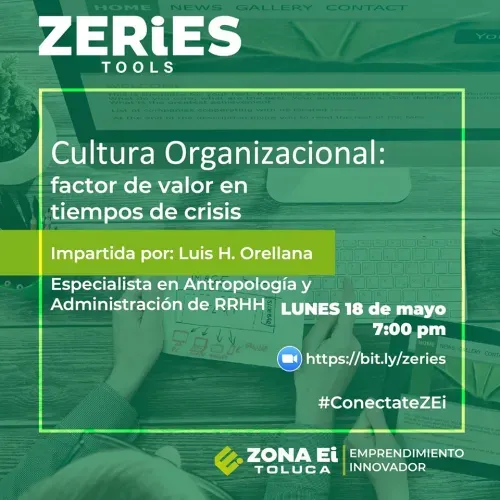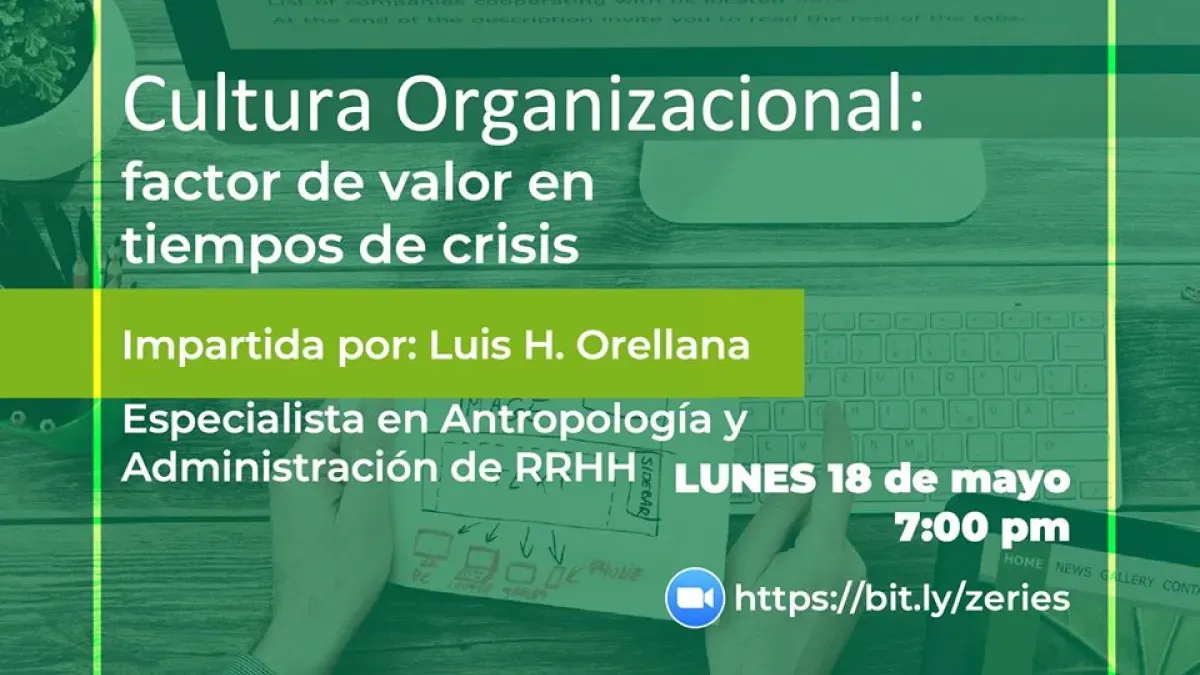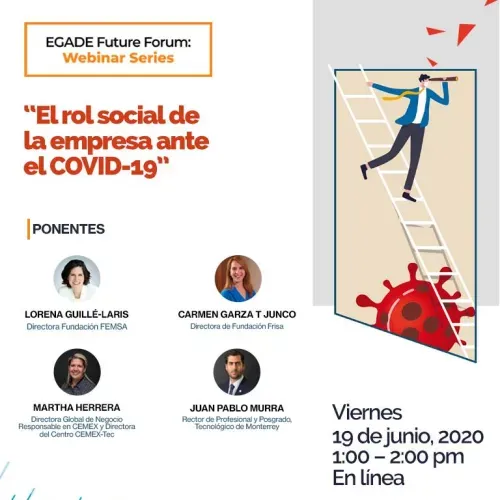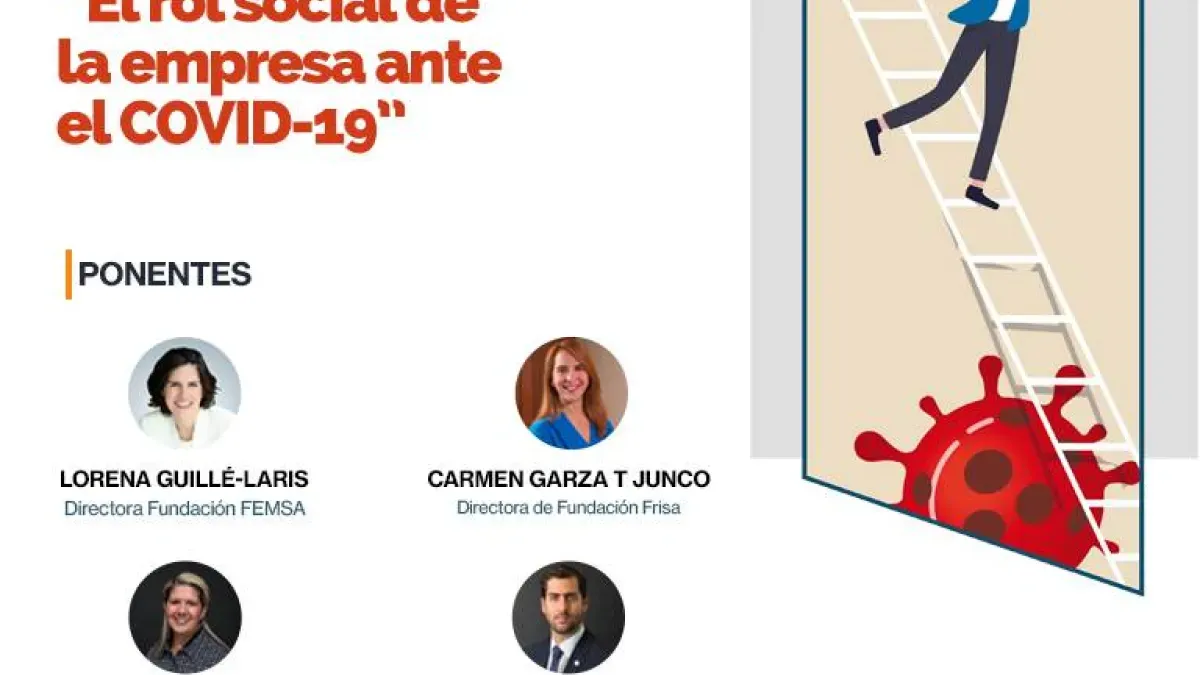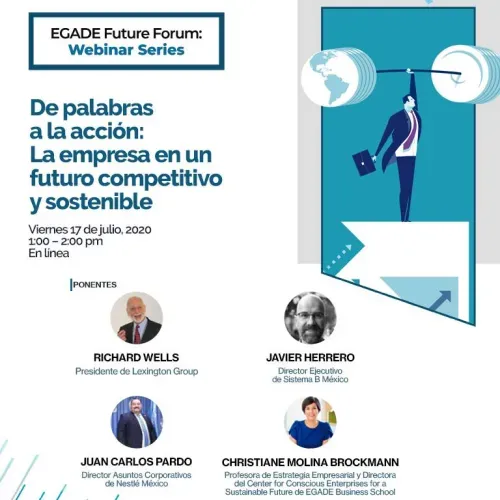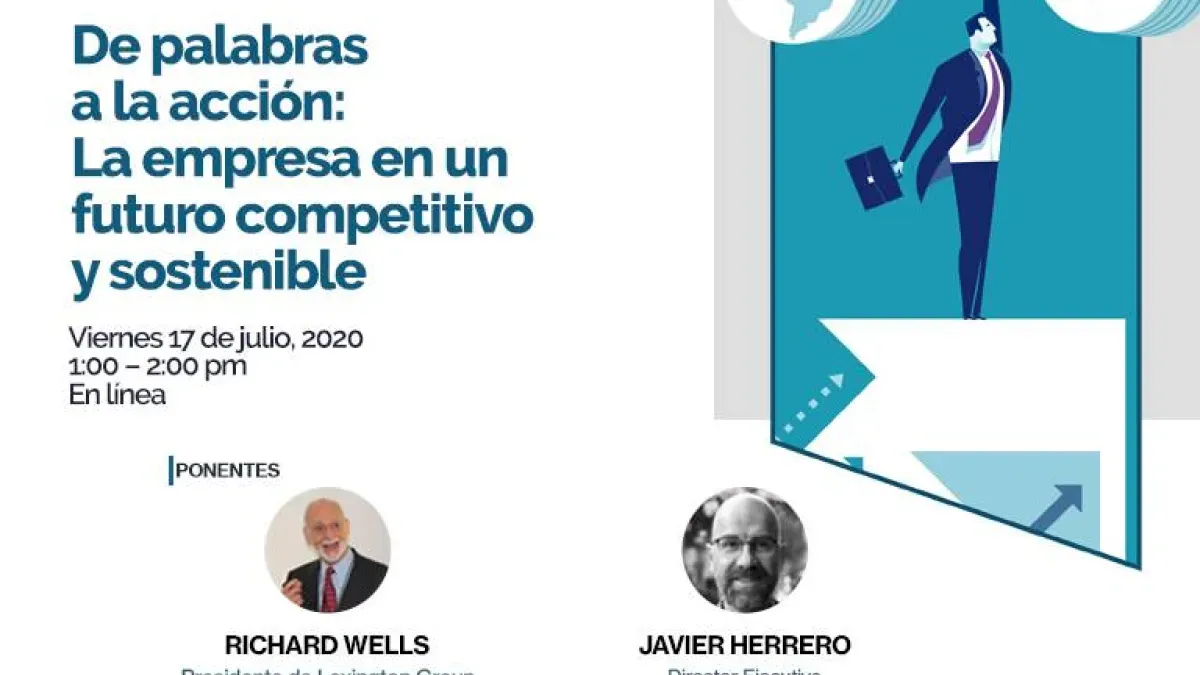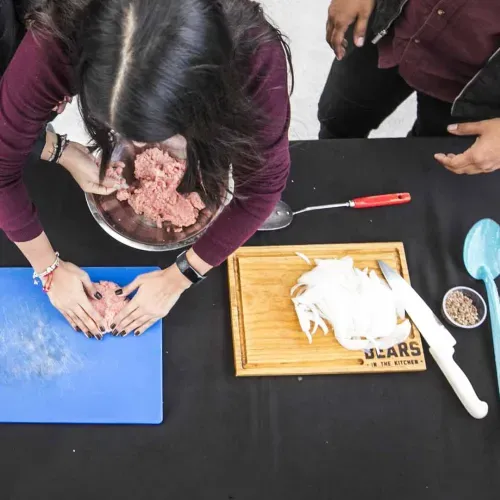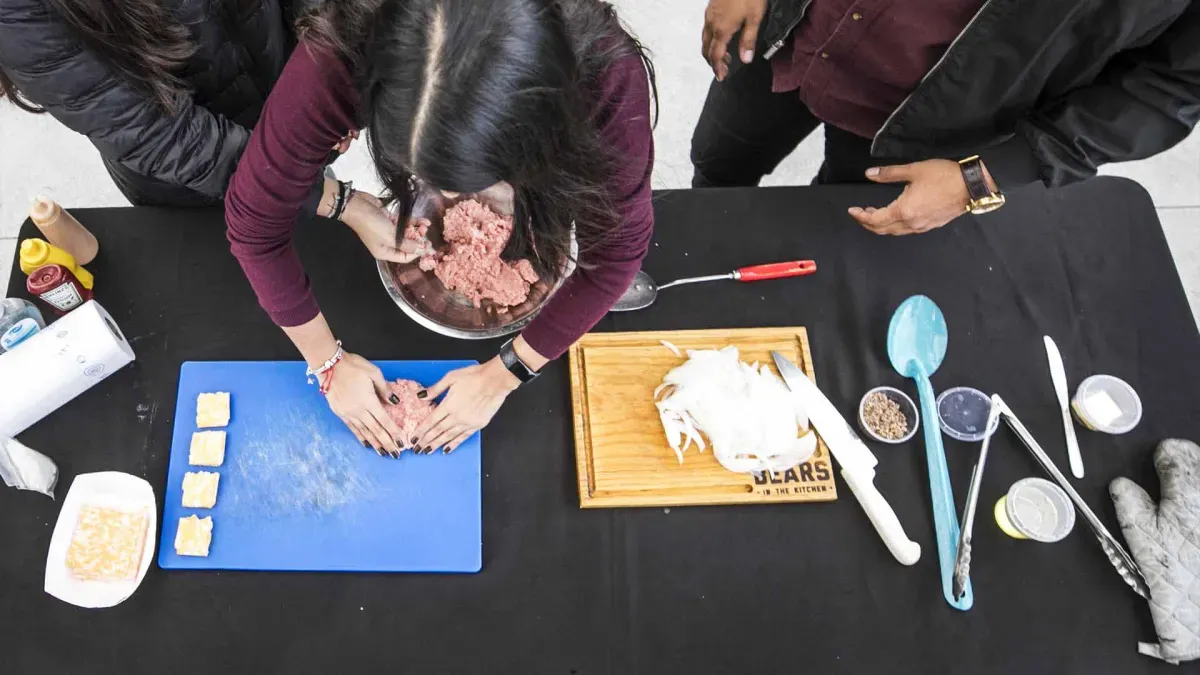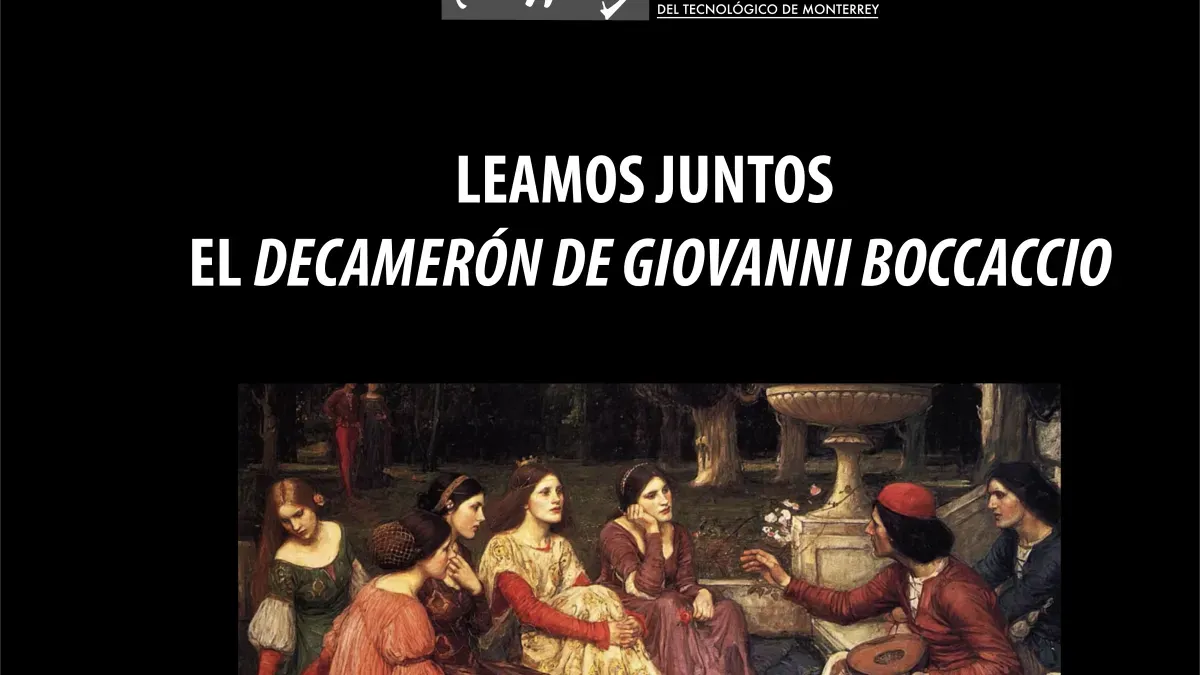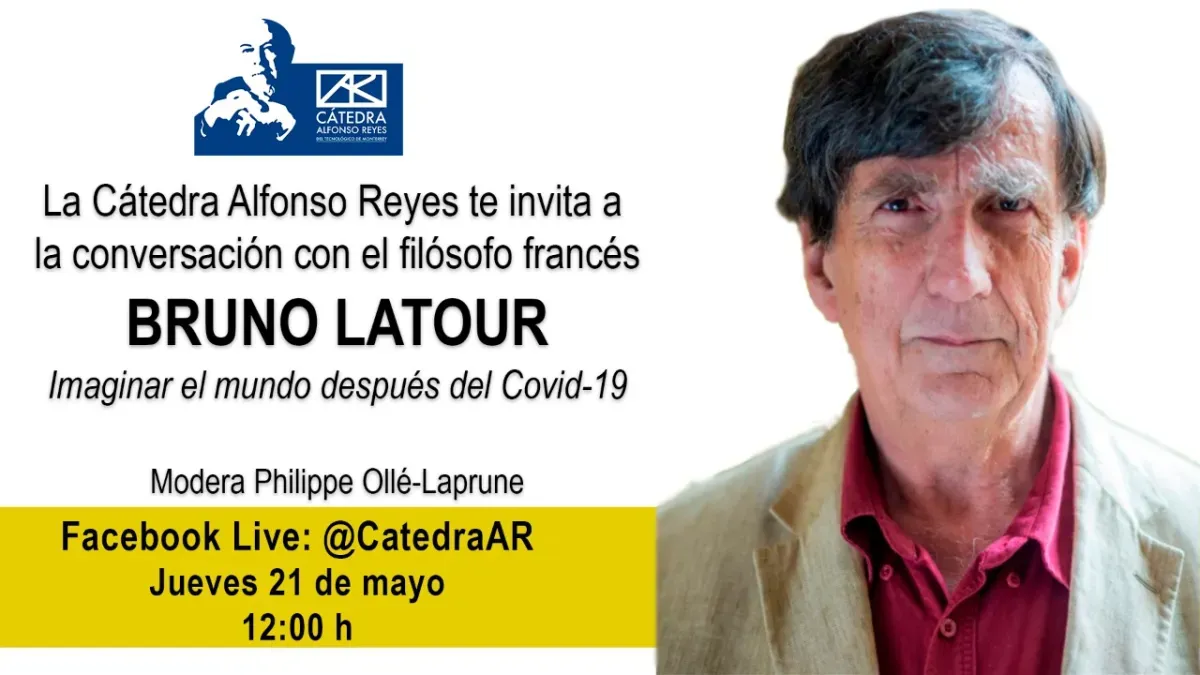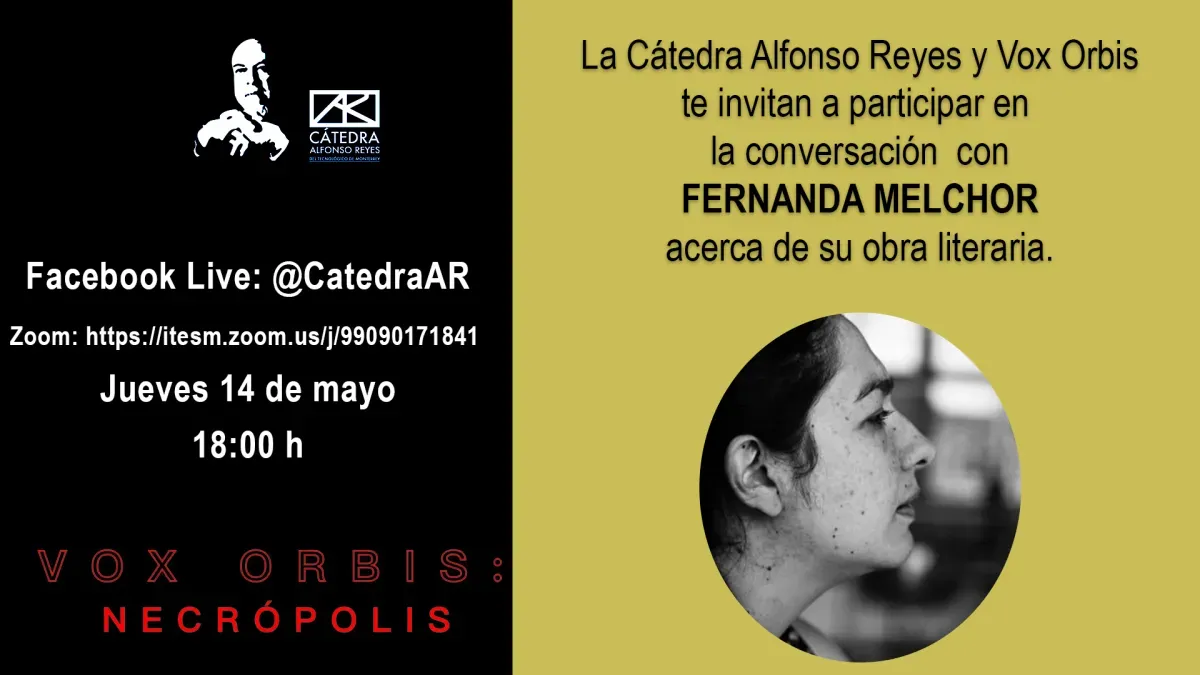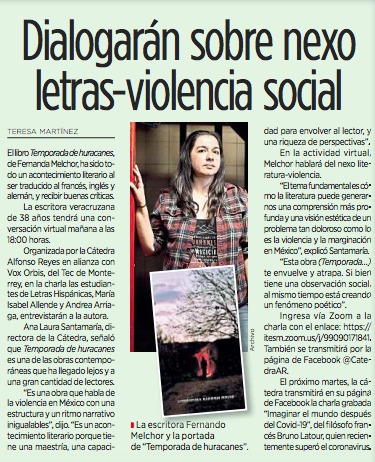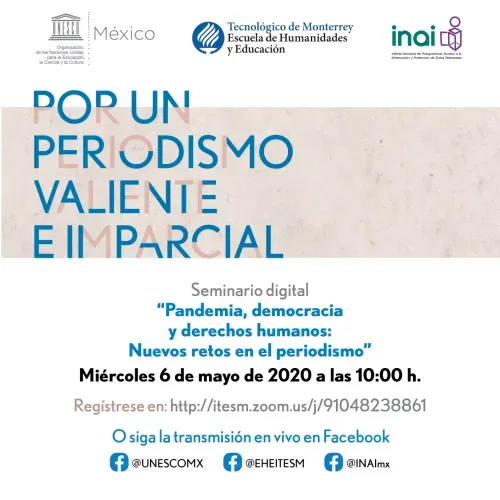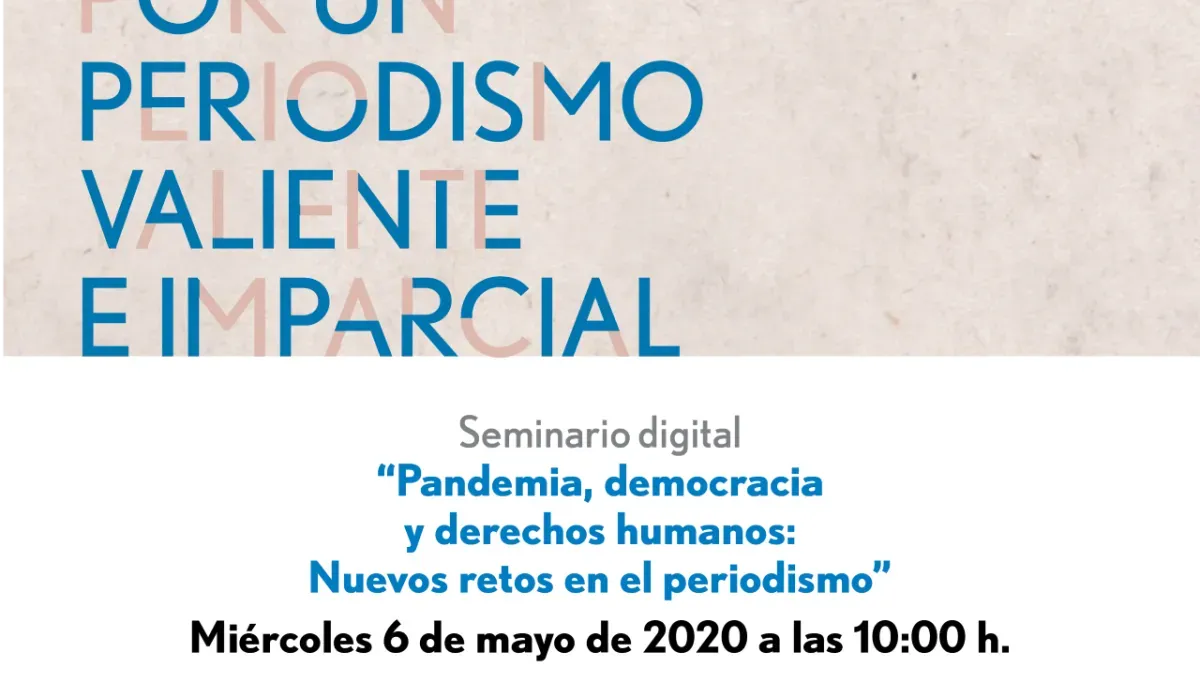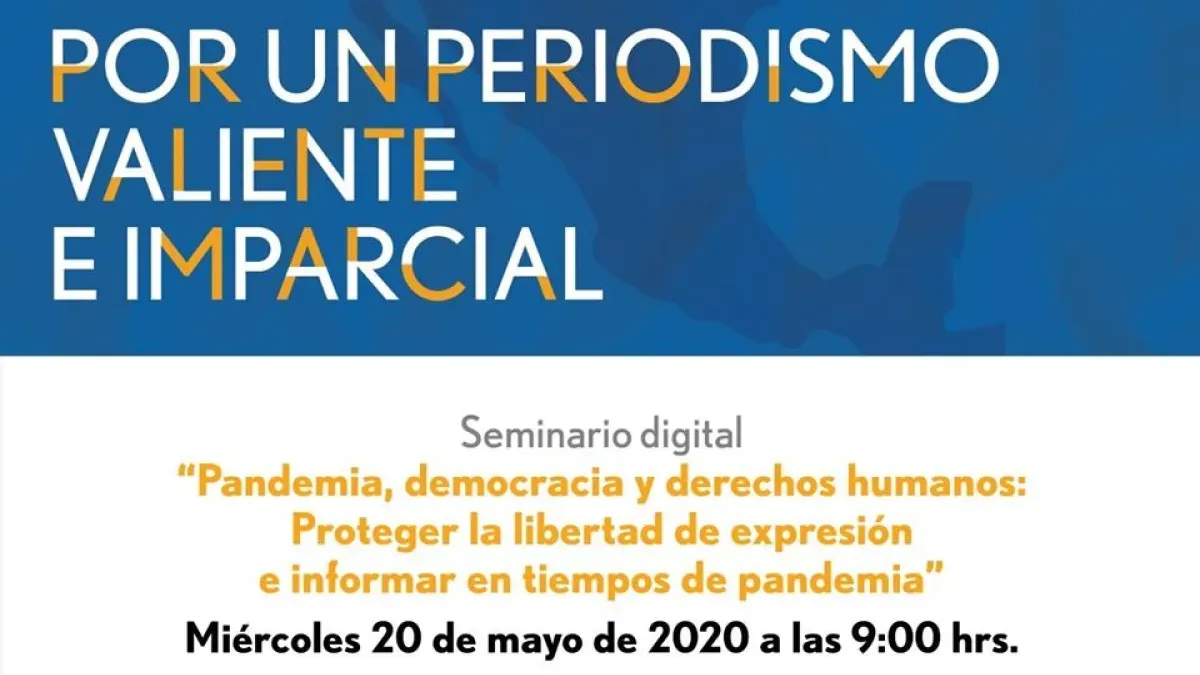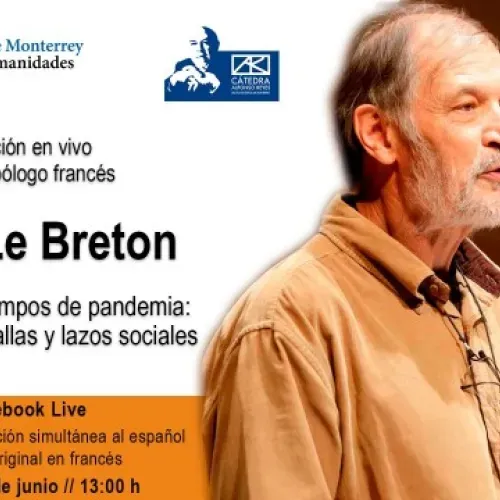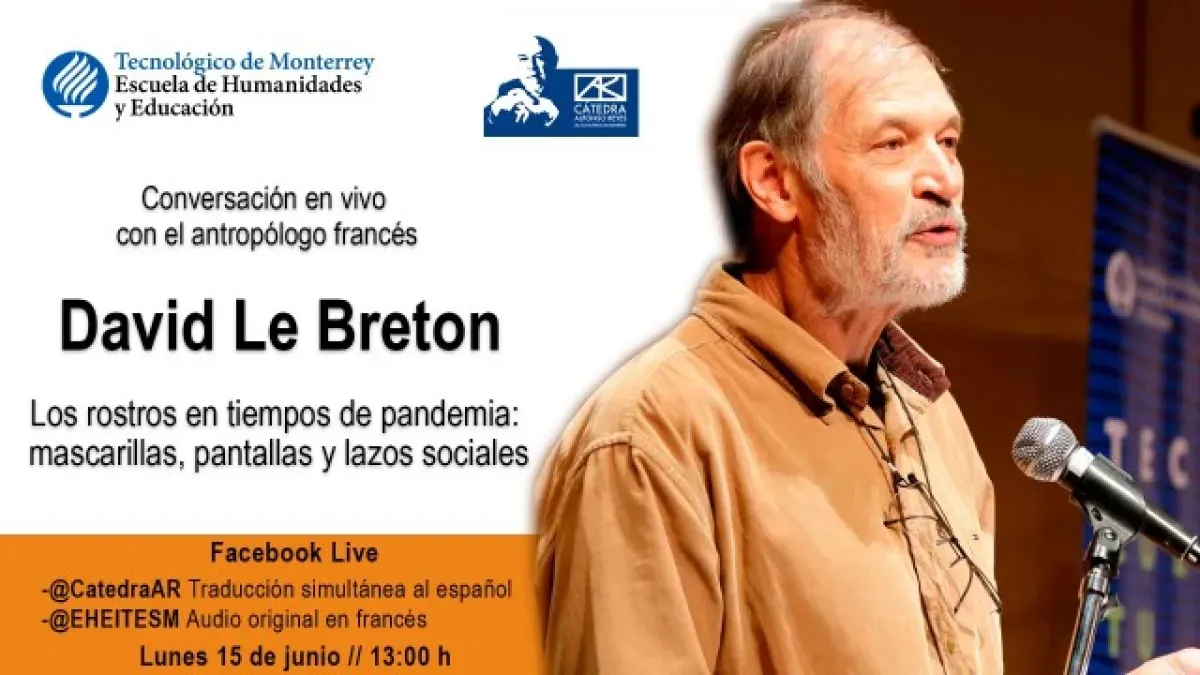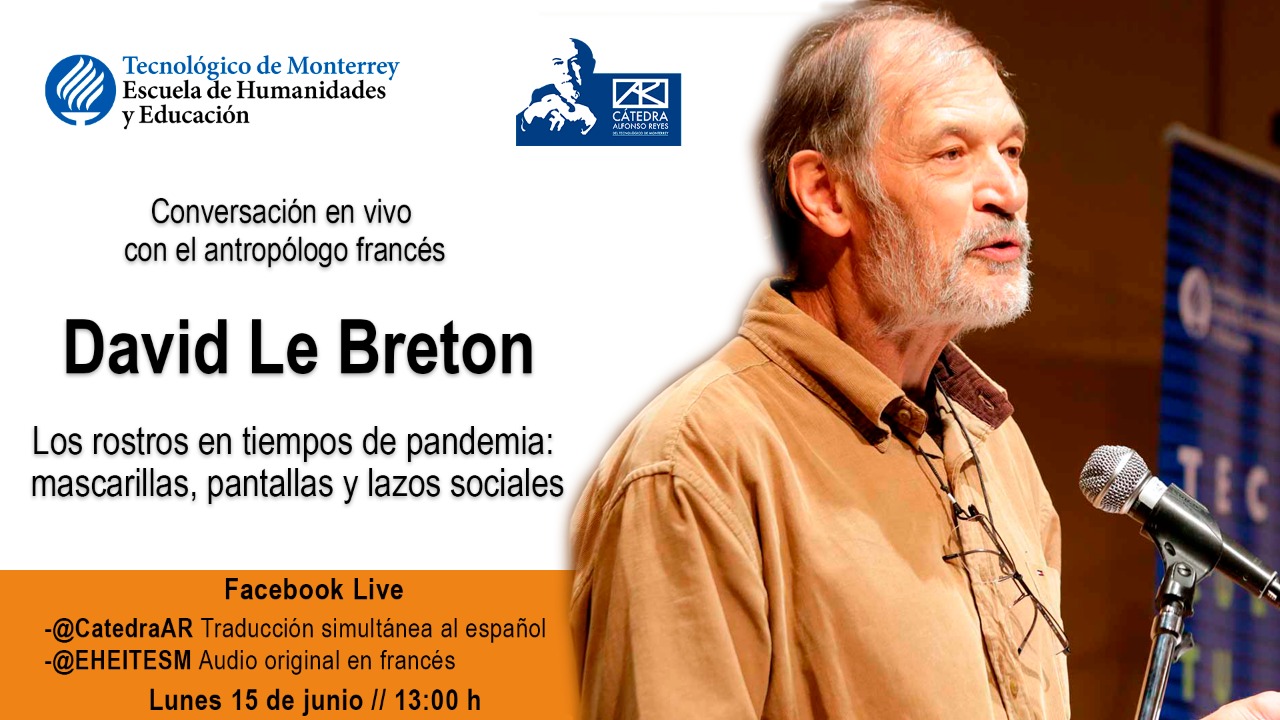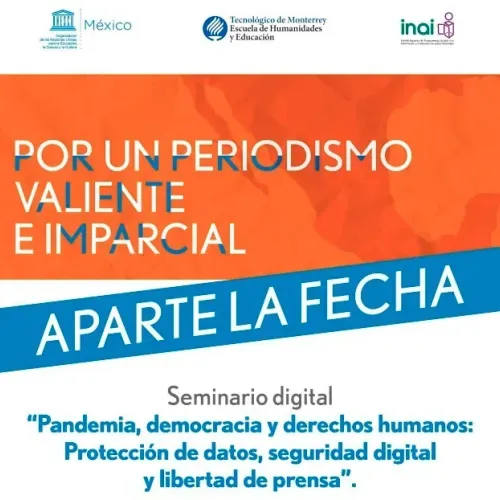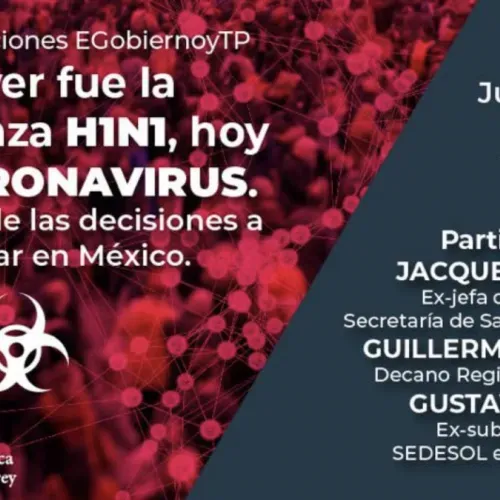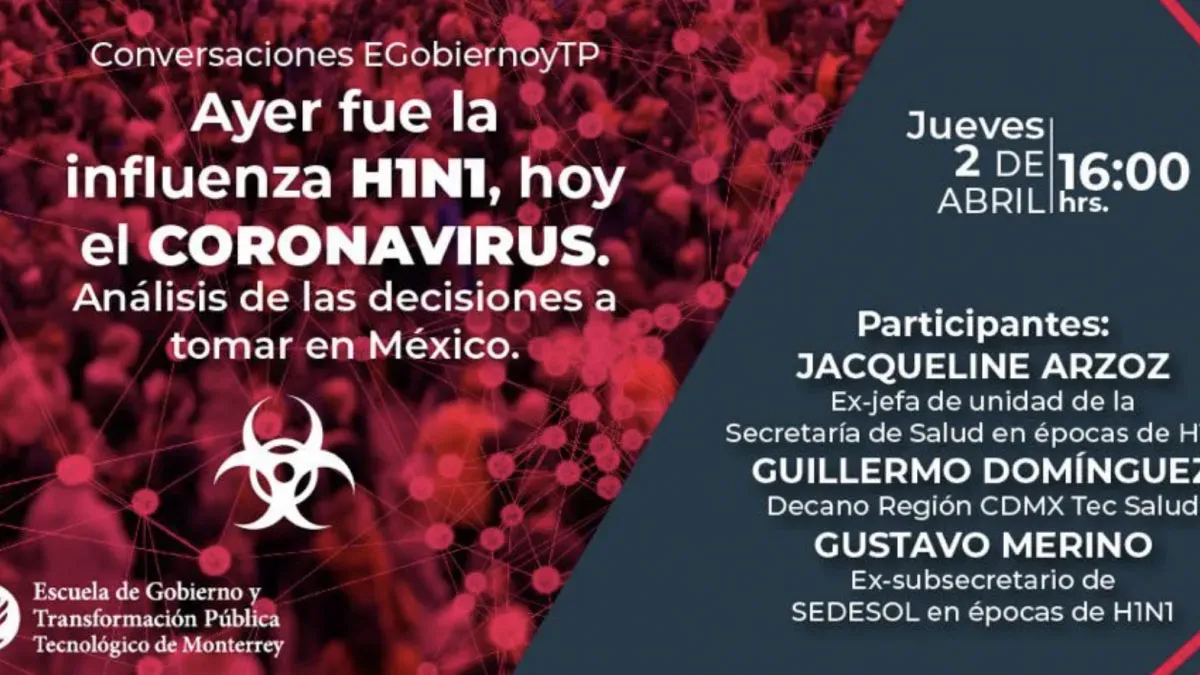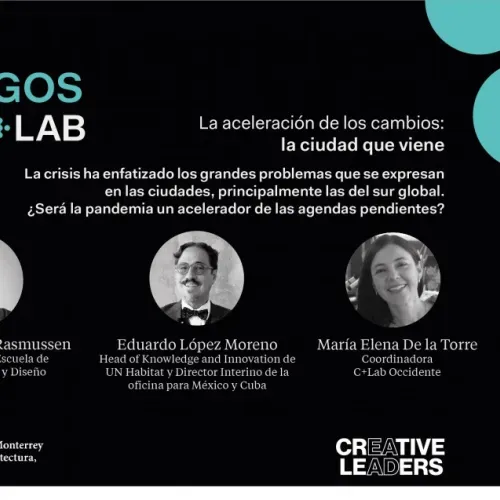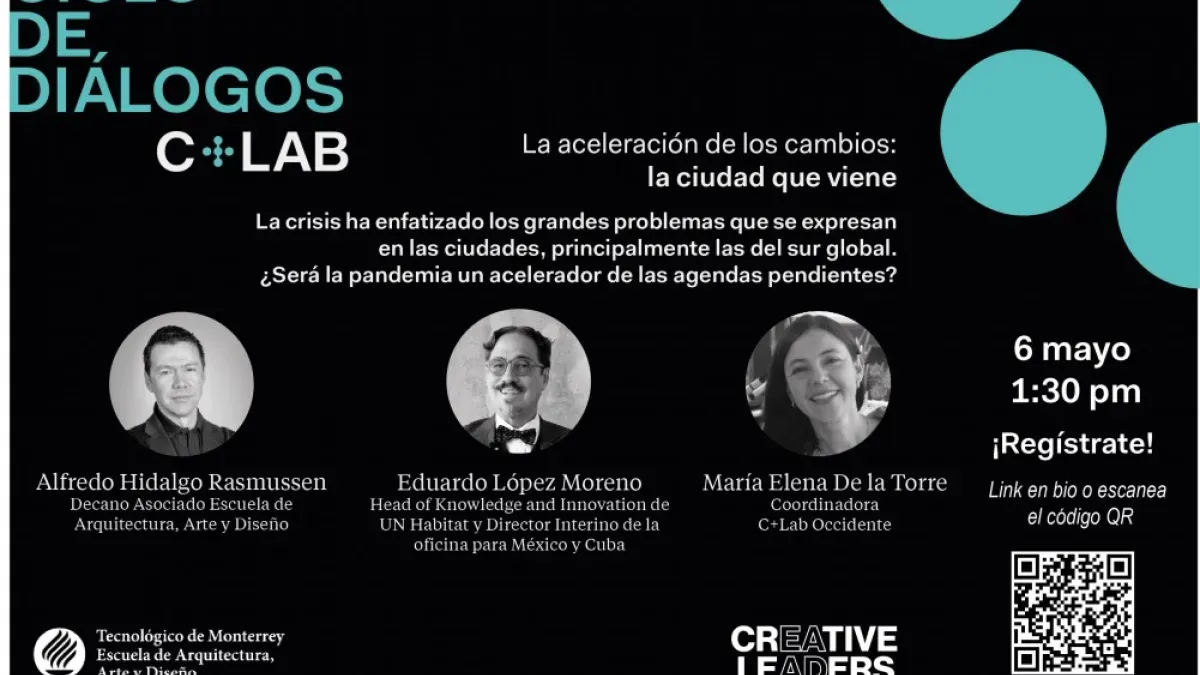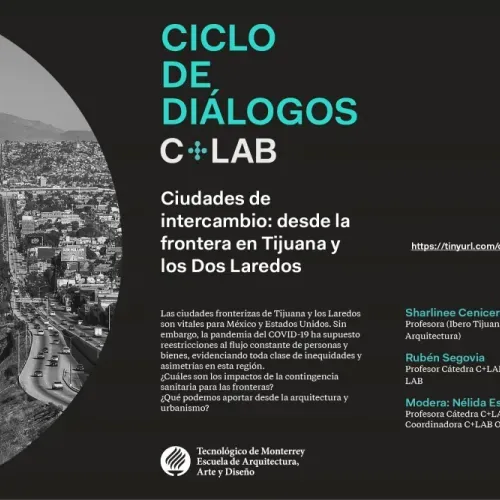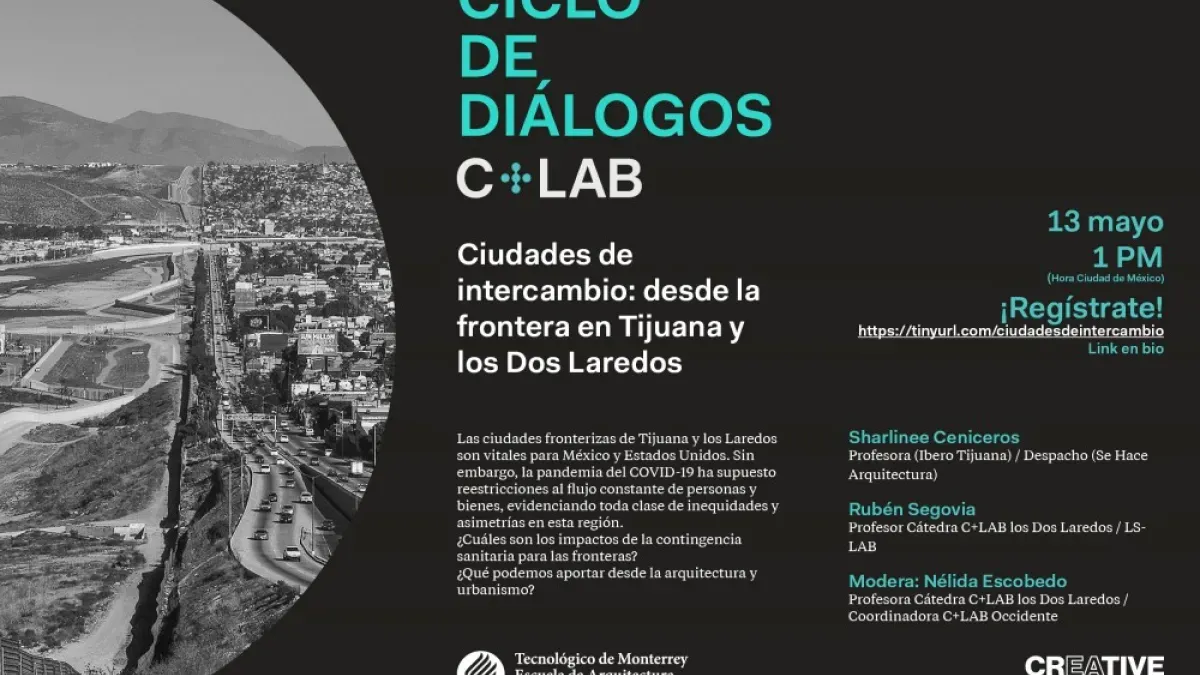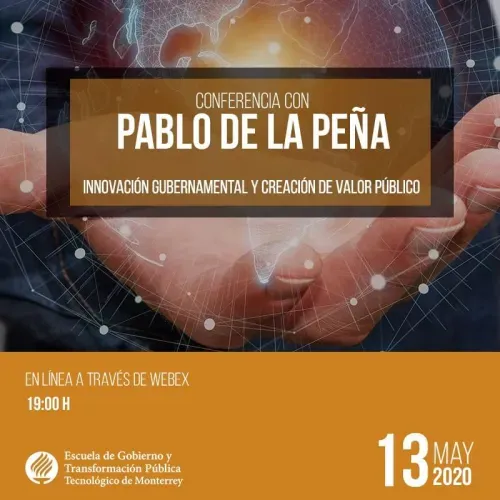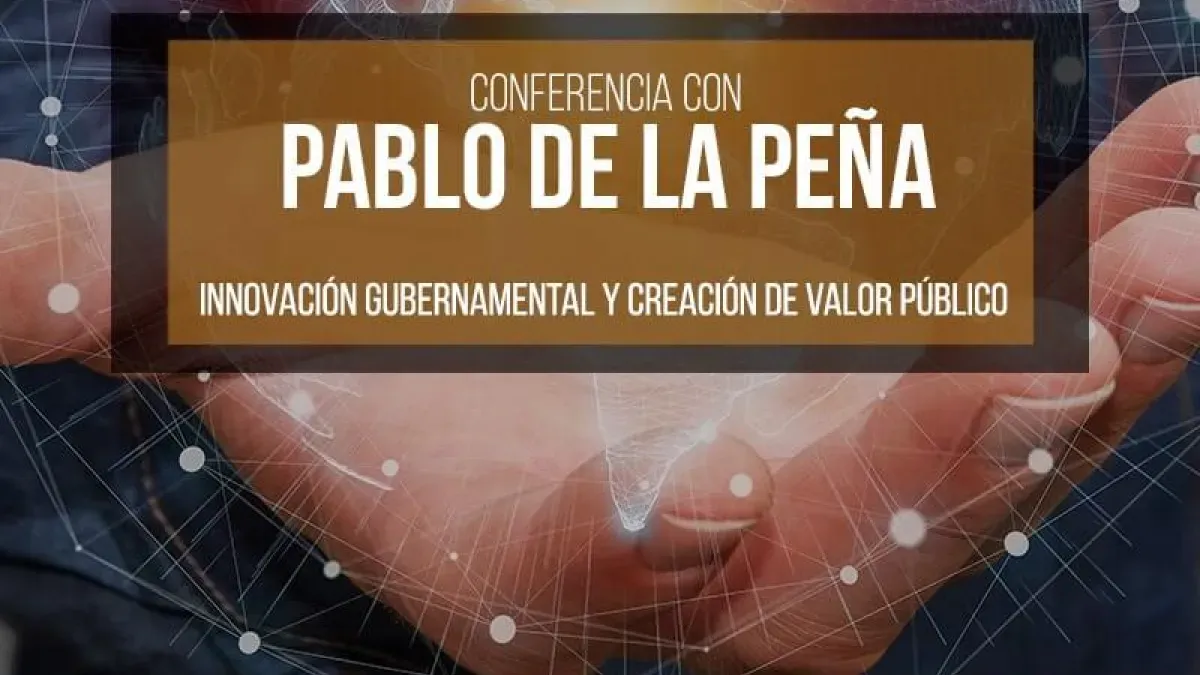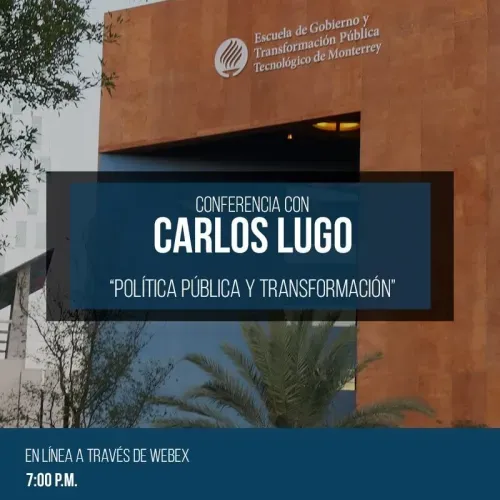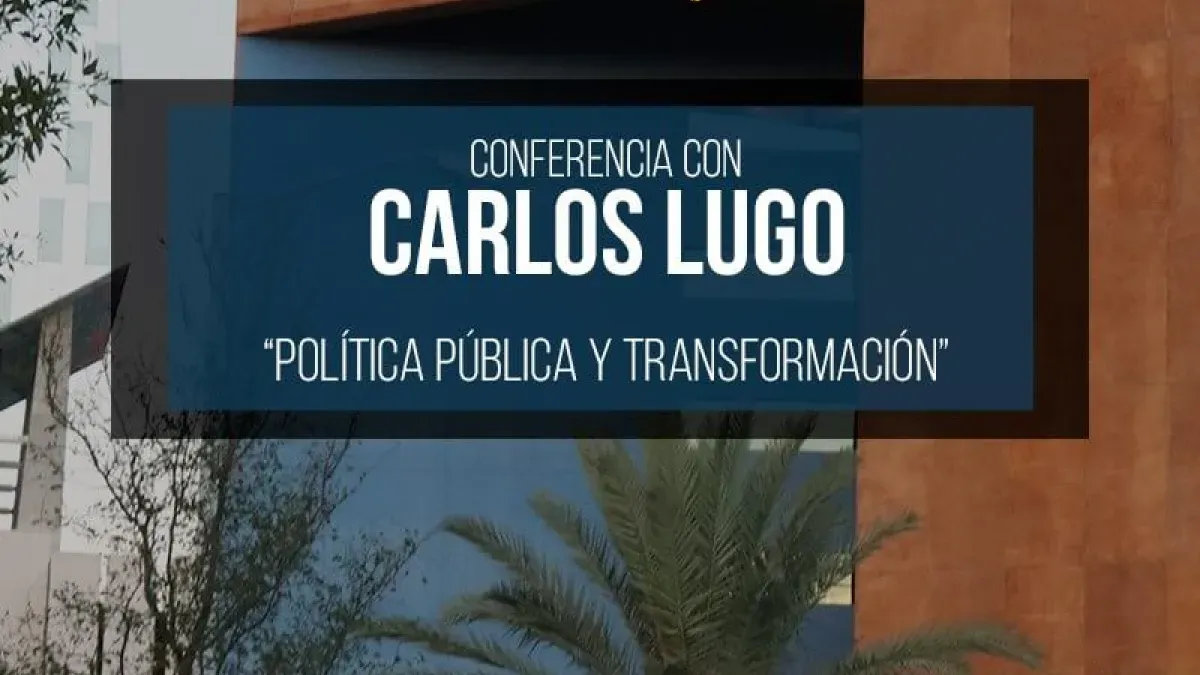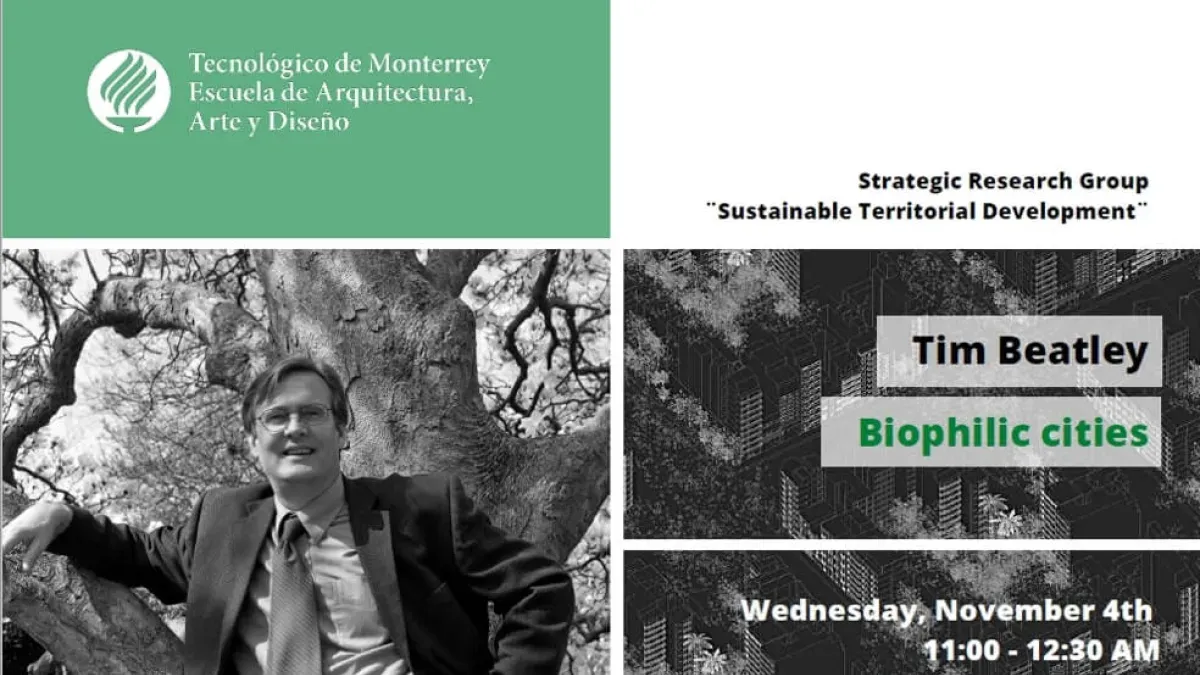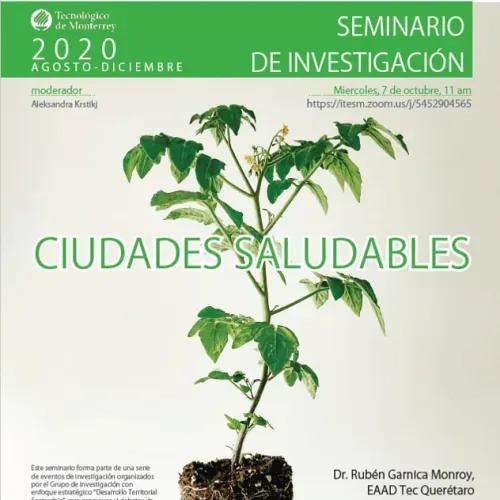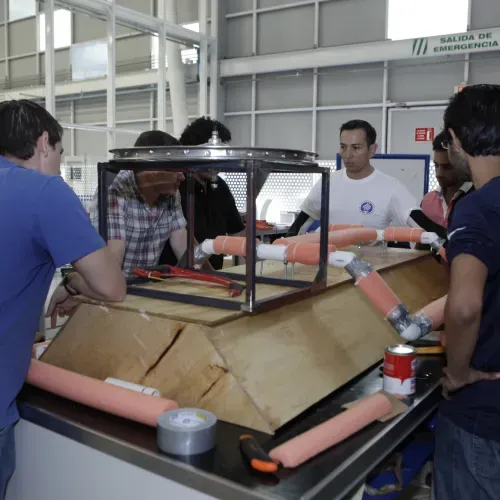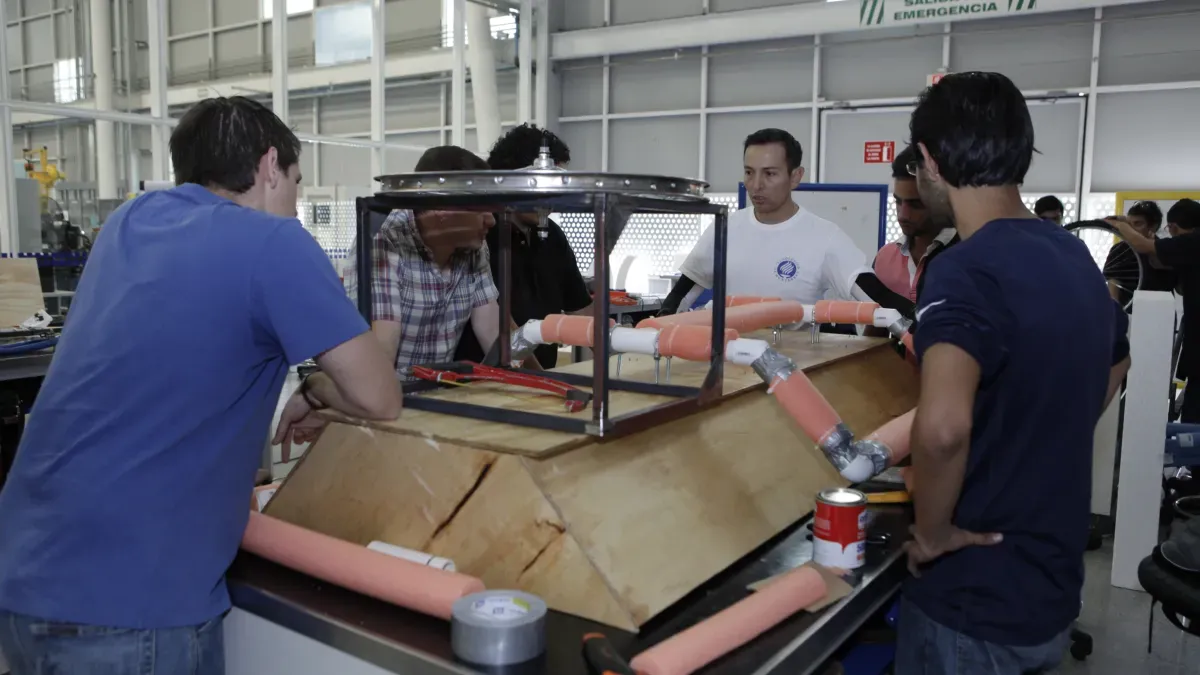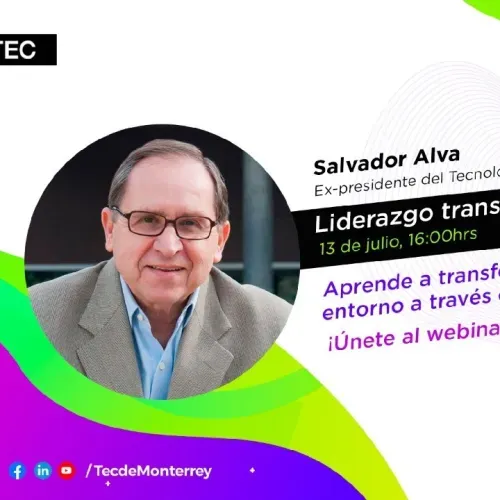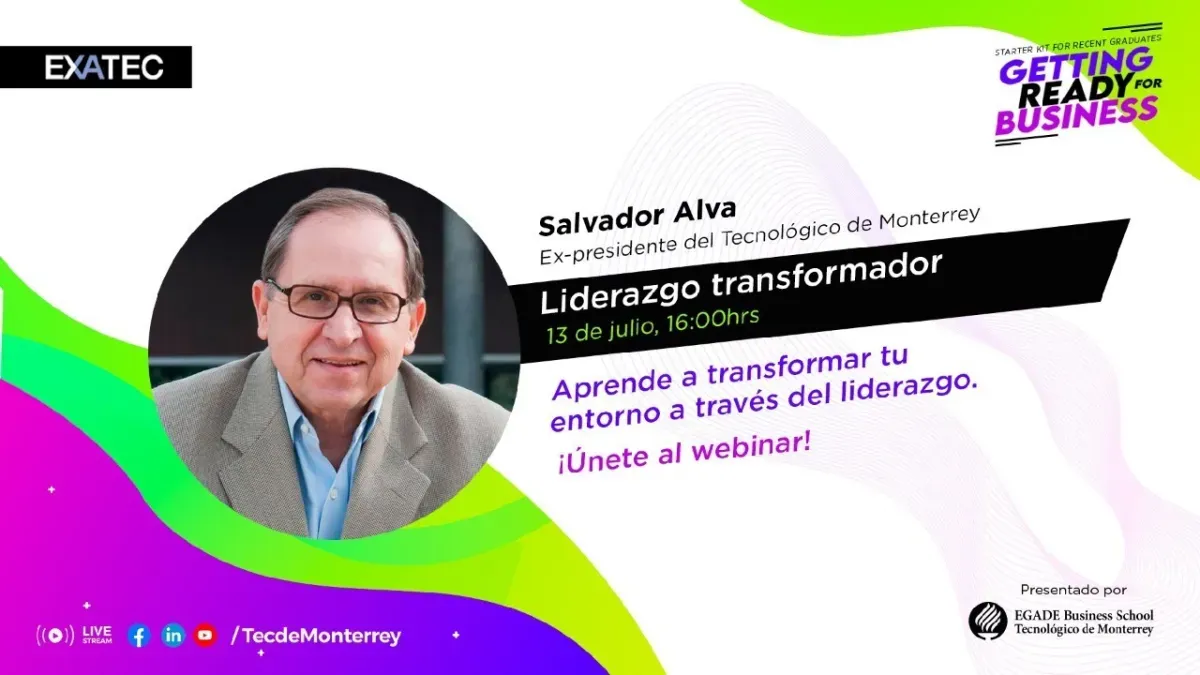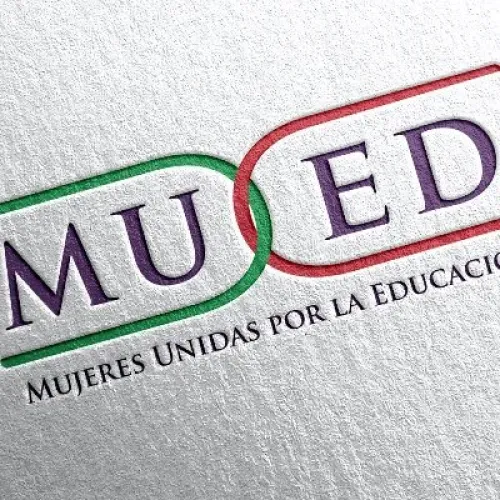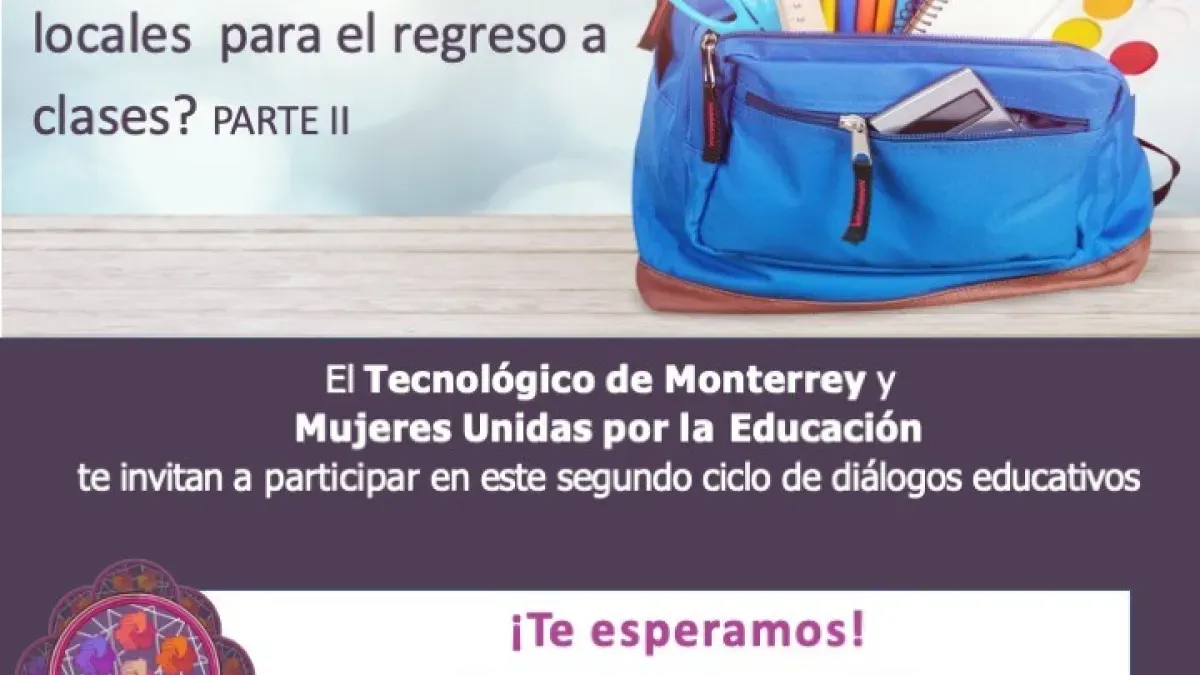Cursos y webinars - Economía y negocios


Experiencias de las empresas familiares presentadas por Cristina Alvarado Álvarez para salir fortalecidos de esta situación de pandemia, desde un ámbito que se comparte con la óptica de España extrapolándolo a la realidad de las familias de México.
Ponente: Cristina Alvarado Álvarez de la Universidad Autónoma de Barcelona
Dirigido a: PyMEs
Impartido el 20 de abril de 2020


La Dra. Adriana Ramirez comenta sobre estrategias y consejos para llevar una economía familiar sana en tiempo de crisis, analizando temas como: ¿cómo actuar ante acreedores?, revisar pólizas de seguro, invertir en educación, aprender cómo manejar las finanzas personales, ¿cómo generar ingresos adicionales? La Dra. Ramírez brinda herramientas y fuentes de consulta útiles, ayudando a generar una cultura de ahorro.
Ponente: Adriana Ramírez de la Escuela de Graduados en Administración y Dirección de Empresas del Tecnológico de Monterrey
Dirigido a: Familias y sociedad en general
Impartido el 13 de abril de 2020


Consejos para sacar los elementos positivos de esta situación, evolucionar en los negocios y pensamientos personales para salir adelante. Compartir mejores prácticas y herramientas sencillas para mejorar las finanzas durante y posterior al COVID-19.
Ponente: Ulises Rodríguez, CEO de Global IT
Dirigido a: PyMEs y sociedad en general
Impartido el 27 de marzo de 2020


Semei Castillo nos platica sobre la situación actual del servicio al cliente y su enfoque, la modificación de procesos y su ejecución impecable.
Ponente: Semei Castillo de Harvard Business Review América Latina
Dirigido a: Organizaciones medianas y grandes
Impartido el 17 de abril de 2020
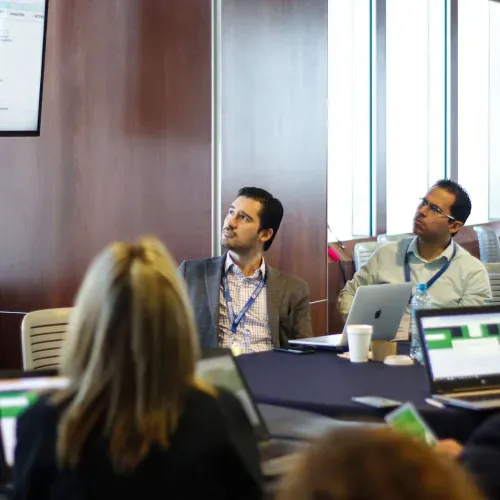
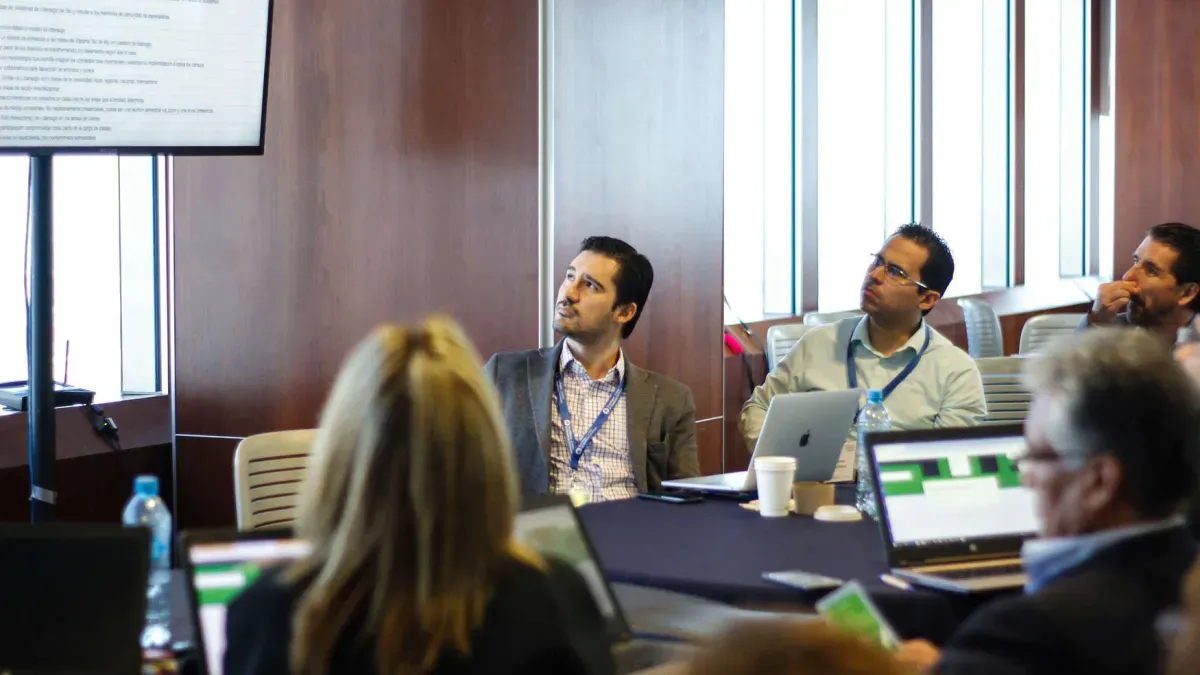
"¿Qué hacen los líderes inspiradores para enfrentar esta crisis?" presenta una conversación sobre la situación que abordan las empresas familiares, con un enfoque en los retos críticos y oportunidades de dichas empresas en áreas como retail, e-commerce y estrategia.
Ponentes: Susana Coppel, Presidenta de Fundación Coppel, e Iván Lansberg, Socio de Lansberg-Gersick
Dirigido a: Organizaciones medianas y grandes
Impartido el 22 de abril de 2020

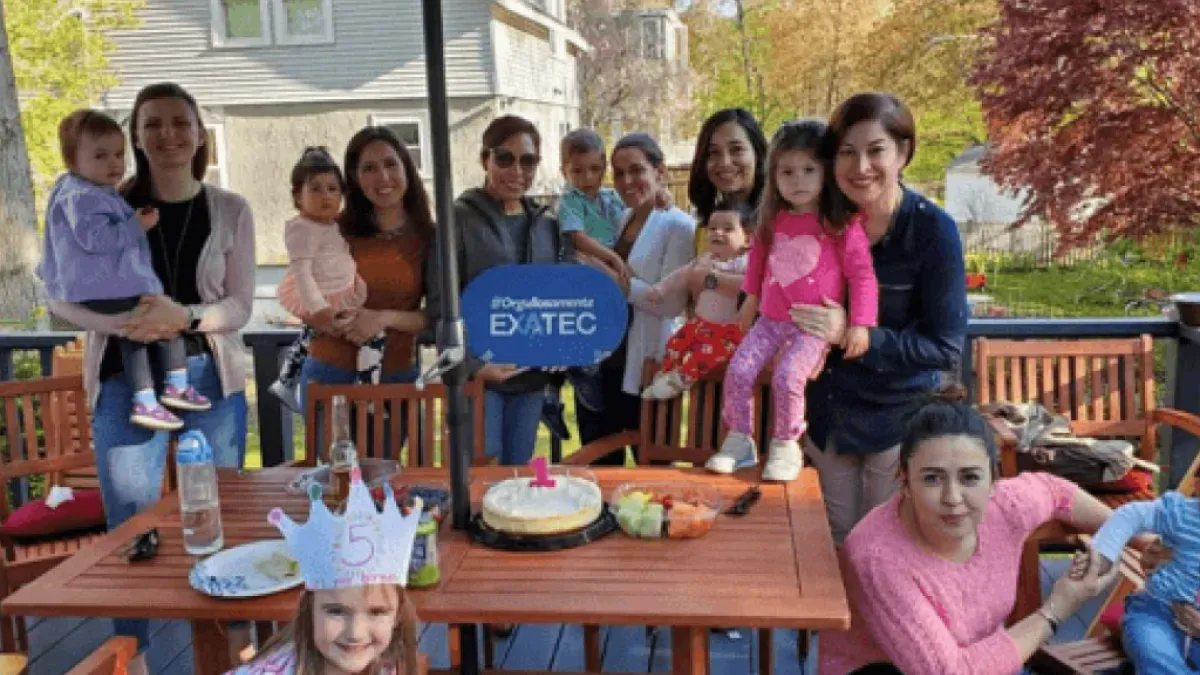
Reflexión sobre la experiencia de la empresas en las acciones realizadas para aprender y generar soluciones para navegar en la crisis.
Ponentes: Susanne Grimm, Consejera Propietaria de Estafeta México, Oscar Howell, Socio Fundador de LFE Windward, y Fernando Sandoval, Director Asociado del Instituto de Familias Empresarias
Dirigido a: Organizaciones medianas y grandes
Impartido el 24 de abril de 2020


Panel de expertos comentando sobre los retos de cómo se reconfigurá la educación en el futuro post-covid, el movimiento hacia un entorno virtual, reestricciones con las que se enfrentarán las universidades a corto, mediano y largo plazo.
Ponente: Juan Enciso, director del Global OneMBA de EGADE Business School; John A. Quelch, Decano de Miami Herbert Business School, y Juan Freire, Decano Asociado Académico de la Escuela de Negocios del Tecnológico de Monterrey.
Dirigido a: Familias y sociedad en general
Impartido el 4 de mayo de 2020


Presentación de Adriana Casillas quien conversa sobre el reto que conlleva el home office, compartiendo experiencias y consejos de metodologías, herramientas, hábitos. Mencionando un check list básico para habilitar el trabajo desde casa.
Ponente: Adriana Casillas, Directora de Headhunter Virtual y Comercial de Bolsa Rosa
Dirigido a: Familia y sociedad en general, PyMEs
Impartido el 30 de abril de 2020


Conversando sobre innovación y emprendimiento, Fernando Moya, José Enrique Alba, para apoyar a las organizaciones. Entendiendo porque la situación actual nos debe llevar a ser más proactivos en las empresas y sociedad, invitando a planificar las acciones de innovación y emprendimiento, a través de consejos y análisis de papers.
Ponente: José Enrique Alba Escamilla, Director de Zona de Emprendimiento Innovador Región CDMX del Tec de Monterrey; Fernando Moya, Director del Departamento de Emprendimiento e Innovación de EGADE Business School, y Ernesto Amorós, Director Nacional de Programas Doctorales de EGADE Business School.
Dirigido a: Medianas y grandes empresas
Impartido el 29 de abril de 2020


Serie de conversaciones en línea con profesores de la Escuela de Gobierno, platicaran sobre mitos y realidades del Covid 19, analizando comentario de autoridades y personalidades en redes sociales. Empezando por un contexto que tiene el ámbito del petróleo y la crisis que se tiene impactando el PIB de México, dando una vista al contexto internacional y sus economías.
Ponente: Luis Serra, Director Ejecutivo de la Iniciativa de Energía del Tecnológico de Monterrey
Dirigido a: Familias y sociedad en general
Impartido el 30 de abril de 2020


Resumen de las iniciativas y acciones que ha tomado el Tecnológico de Monterrey para hacer frente al COVID-19.
Dirigido a: Familias y sociedad en general
Impartido el 29 de abril de 2020


Carlos Salazar Lomelí charlará sobre el panorama actual y como liderar en las organizaciones, afrontando una colaboración entre la iniciativa privada y pública. Brindando la situación complicada que enfrenta México en cuanto a las políticas monetarias, públicas y los pronósticos de impacto social así como la recuperación de la economía.
Ponente: Carlos Salazar, Presidente del Consejo de EGADE Business School del Tecnológico de Monterrey
Dirigido a: Medianas y grandes empresas
Impartido el 28 de abril de 2020


Charla para conversar sobre la ciencia de datos, tratando temas vinculados a la cuestión social, qué se puede hacer por el bien de la sociedad con el apoyo de datos, compartiendo experiencias en el análisis de datos y el bien común que se puede lograr.
Ponente: María del Carmen Jiménez del Tecnológico de Monterrey
Dirigido a: Familias y sociedad en general
Impartido el 23 de abril de 2020


Charla de Karla Gámez sobre su experiencia dentro de los retos que enfrenta la industria alimentaria en cuanto a la proveeduría y los cambios en la demanda por el cambio en los hábitos de consumo.
Ponente: Karla Gámez, Líder Logística y Cadena de Suministro de Sigma Alimentos
Dirigido a: Medianas y grandes empresas
Impartido el 22 de abril de 2020


Héctor Villarreal conversará sobre cómo podemos entender las finanzas públicas y los retos que se tienen en esta crisis sanitaria y financiera, conectándolo con lo que afecta nuestras vivencias.
Ponente: Héctor Villareal, Profesor-Investigador de la Escuela de Gobierno y Transformación Pública del Tecnológico de Monterrey
Dirigido a: Familias y sociedad en general
Impartido el 15 de abril de 2020


Charla de Alejandro Poiré sobre el futuro de las democracias ante la pandemia global y sus consecuencias económicas, explicando cómo las tecnologías son el mejor aliado para salir de ellas.
Ponente: Alejandro Poiré, Decano de la Escuela de Ciencias Sociales y Gobierno del Tecnológico de Monterrey
Dirigido a: Familias y sociedad en general
Impartido el 15 de abril de 2020


Gabriela Siller conversara sobre el impacto económico del COVID-19 y los escenarios que afectan tales como el precio del petróleo, políticas económicas y fiscales para mitigar riesgos, etc.
Ponente: Gabriela Siller, Directora de Análisis Económico y Financiero de Banco BASE
Dirigido a: Familias y sociedad en general, gobiernos locales
Impartido el 3 de abril de 2020


En "Disrupción de las Cadenas de Suministro de Alimentos durante la pandemia" se habla de cómo el abastecimiento de alimentos perecederos y de productos de consumo masivo han sido afectado por las disrupciones en la producción, la logística y comportamientos irregulares de la demanda en el contexto de la pandemia.
En un entorno minorista de distintos formatos como tiendas de barrio, tiendas de conveniencia, supermercados y clubes de descuento inmersos en muy diversos contextos sociales.
Ponente: Christopher Mejía, Director de la Red SCALE MIT LATAM, Eliseo Vilalta-Perdomo, Profesor Asociado de University of Lincoln.
Dirigido a: PyMEs, familias y sociedad en general
Impartido el 29 de abril de 2020


En el webinar "Complejidad económica y desarrollo regional" Fernando Gómez platica sobre el insight de la complejidad económica actual, dando pie al diseño de políticas públicas que puedan impulsar regiones. Dentro de este webinar, se ven los retos de desarrollo, definición de complejidad económica así como sus aplicación en México.
Ponente: Fernando Gómez, del Tecnológico de Monterrey
Dirigido a: Familias y sociedad en general
Impartido el 29 de abril de 2020


En "Emprendiendo a través de alianzas, responsabilidad social y comunicación social", Ana Sofía Sada, platica sobre el emprendimiento social: Su experiencia en la empresa Puente y Coma, así como ejemplos en diversas áreas en las que se incluye la responsabilidad social.
Ponente: Ana Sofía Sada, Directora de Puente y Coma
Dirigido a: PyMEs, familias y sociedad en general
Impartido el 28 de abril de 2020


En el webinar "Innovación para modelo de negocios social ¿Cómo nos reinventamos en tiempo de crisis? ", Yrasema Cruz, platica sobre importancia del emprendimiento social y la innovación social y el auge actual de los emprendimientos utilizando los modelos de innovación.
Ponente: Yrasema Cruz, Coordinador de Emprendimiento e Innovación de la Universidad Autónoma de Sinaloa
Dirigido a: PyMEs, familias y sociedad en general
Impartido el 29 de abril de 2020


En "Plan de continuidad y resiliencia del negocio" se platica sobre conceptos, herramientas y aplicaciones para poder implementarlas en cualquier PyME. En esta presentación podrás conocer sobre: resiliencia, planes, herramientas y modelos de recuperación que una empresa puede implementar inmediatamente durante una crisis como la que se presenta actualmente.
Ponente: Luis Montoya del Tecnológico de Monterrey
Dirigido a: PyMEs
Impartido el 29 de abril de 2020


Adolfo Ferrer, premio nacional emprendedor, nos platica sobre su decisión de emprender, y sobre su proyecto educativo: Liks, el cual ayuda a niños a poder llegar a ser emprendedores desde temprana edad cultivando su curiosidad y desarrollando su imaginación al máximo.
Ponente: Adolfo Ferrer, CEO y fundador de Liks
Dirigido a: Familias y sociedad en general
Impartido el 29 de abril de 2020


¿Estás preparado ante esta dificultad económica a nivel global?
Ponente: Armando Villa de América y Global Business Counselors
Dirigido a: Familias y sociedad en general
Impartido el 5 de mayo de 2020


En el webinar "Finanzas para la vida, hacia una cultura de ahorro", Elvira Torres, consultora en finanzas personales, autora del libro "Cuentas claras, relaciones largas", brinda consejos para fomentar una cultura financiera de ahorro, inversión y protección del patrimonio buscando el bienestar de la familia.
Ponente: Elvira Torres del Tecnológico de Monterrey
Dirigido a: Familia y sociedad en general
Impartido el 6 de mayo de 2020


¿Cómo proteger el patrimonio personal en la tormenta de los mercados financieros?
Ponente: Roberto Chávez, Asesor de Estrategias de Inversión de la Asociación Mexicana de Instituciones Bursátiles
Dirigido a: Familias y sociedad en general, micro y pequeñas empresas
Impartido el 15 de mayo de 2020


En este webinar un panel de expertos platican desde las perspectivas del sector público y del sector empresarial. "Recuperación económica y el sector empresarial" es parte de la serie "A la altura del desafío: Liderazgo en el contexto de COVID-19".
Ponente: María Concepción del Alto, directora de la Maestría en Finanzas en EGADE Business School, sede Monterrey; Javier Treviño, titular de la Dirección de Política Pública del Consejo Coordinador Empresarial, y Patricia Terrazas, diputada federal y presidenta de la Comisión de Hacienda y Crédito Público de la Cámara de Diputados
Dirigido a: Familias y sociedad en general, medianas y grandes empresas
Impartido el 20 de mayo de 2020


Rodolfo nos platicará sobre la importancia de la comunicación en tiempos de crisis e incertidumbre. "Comunicación en tiempos COVID-19: actuando bajo un verdadero ambiente VUCA" es parte de la serie "A la altura del desafío: Liderazgo en el contexto de COVID-19"
Ponente: Rodolfo Rubio, Vicepresidente de Comunicación y Relaciones del Tecnológico de Monterrey
Dirigido a: Familias y sociedad en general
Impartido el 22 de mayo de 2020


Recomendaciones para enfrentar la incertidumbre y salir bien librado de la contingencia
Ponente: Edgar Castillo, Consultor Senior del Centro de Innovación Empresarial y Financiera
Dirigido a: Familias y sociedad en general, micro y pequeñas empresas
Impartido el 20 de mayo de 2020


Cuando estamos frente al crecimiento de la empresa o al realizar un nuevo proyecto, se busca un financiamiento, en el webinar "Manejo de deuda: Financiamiento y crowdfunding" se presentan nuevas formas de financiamiento en la era digital.
Ponente: Edgar Castillo, Consultor Senior del Centro de Innovación Empresarial y Financiera
Dirigido a: Familias y sociedad en general, micro y pequeñas empresas
Impartido el 23 de mayo de 2020


En el webinar "Cómo enfrentar la incertidumbre, crisis y gestión empresarial" se presenta una guía práctica para dirigir a la empresa al éxito frente un entorno complejo.
Ponente: Edgar Castillo, Consultor Senior del Centro de Innovación Empresarial y Financiera
Dirigido a: Familia y sociedad en general, Micro y pequeñas empresas
Impartido el 19 de mayo de 2020


Cambio en el manejo de inversiones y financiamiento frente a situaciones inesperadas.
Ponente: Alejandro Aguilera del Tecnológico de Monterrey
Dirigido a: Familias y sociedad en general, micro y pequeñas empresas
Impartido el 11 de mayo de 2020


La visión del CEO sobre la importancia de las personas: ¿Cómo re-diseñar el futuro? "Las personas como fortaleza crítica ante la adversidad" es parte de la serie "A la altura del desafío: Liderazgo en el contexto de COVID-19" de EGADE Business School.
Ponente: Fernando Eguiluz, CEO de BBVA Perú, y Alejandro Olivera, Decano Asociado de Educación Continua de la Escuela de Negocios del Tecnológico de Monterrey
Dirigido a: Medianas y grandes empresas
Impartido el 15 de mayo de 2020


Ramses, de la empresa Sistema B. Nos platicará sobre una economía más inclusiva, equitativa y regenerativa. invitando a sumarse a esta charla de reflexión en donde las empresas y emprendimientos deben ser fuerzas para el bien.
Ponente: Ramsés Gómez, Director de Sistema B
Dirigido a: Familias y público en general.
Impartido el 6 de mayo de 2020


Cómo identificar oportunidades de negocio ante un ambiente de incertidumbre y riesgo, se cierra con la estructuración de un formato para organizar la idea de negocio.
Ponente: Luis Castellanos, Consultor Asociado de HUMA Constructores
Dirigido a: Familias y sociedad en general, micro y pequeñas empresas
Impartido el 20 de mayo de 2020


Módulo 1 de la serie de cursos en línea donde se aborda el tema de las herramientas de reconstrucción de la economía en tiempos de COVID-19
Ponente: Elvira Naranjo, Doctora en Política Pública y Maestra en Economía y Política Pública por la Escuela de Gobierno y Transformación Pública del Tecnólogico de Monterrey
Dirigido a: Investigadores, familias y sociedad en general
Impartido el 21 de mayo del 2020


Estrategia para tiempos de crisis y cómo el design thinking ayuda a las empresas en esos momentos
Ponente: Alejandro Rodríguez, Profesor Investigador del Tecnológico de Monterrey
Dirigido a: Medianas y grandes empresas
Impartido el 21 de mayo del 2020


Conoce los básicos en ciberseguridad para un trabajo efectivo, responsable y seguro desde tu casa
Ponente: Félix Barrio Juárez, Director del Hub de Ciberseguridad del Tec de Monterrey
Dirigido a: Micro y pequeñas empresas
Impartido el 12 de mayo del 2020
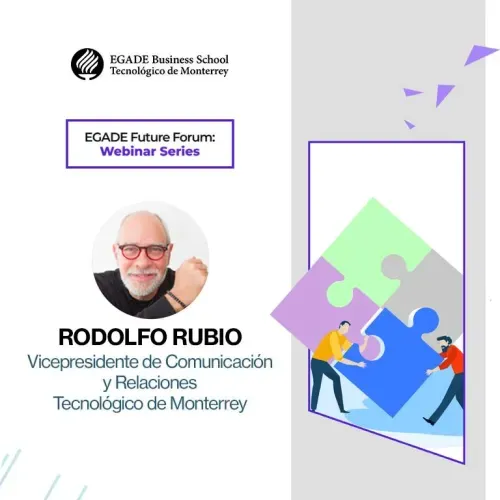
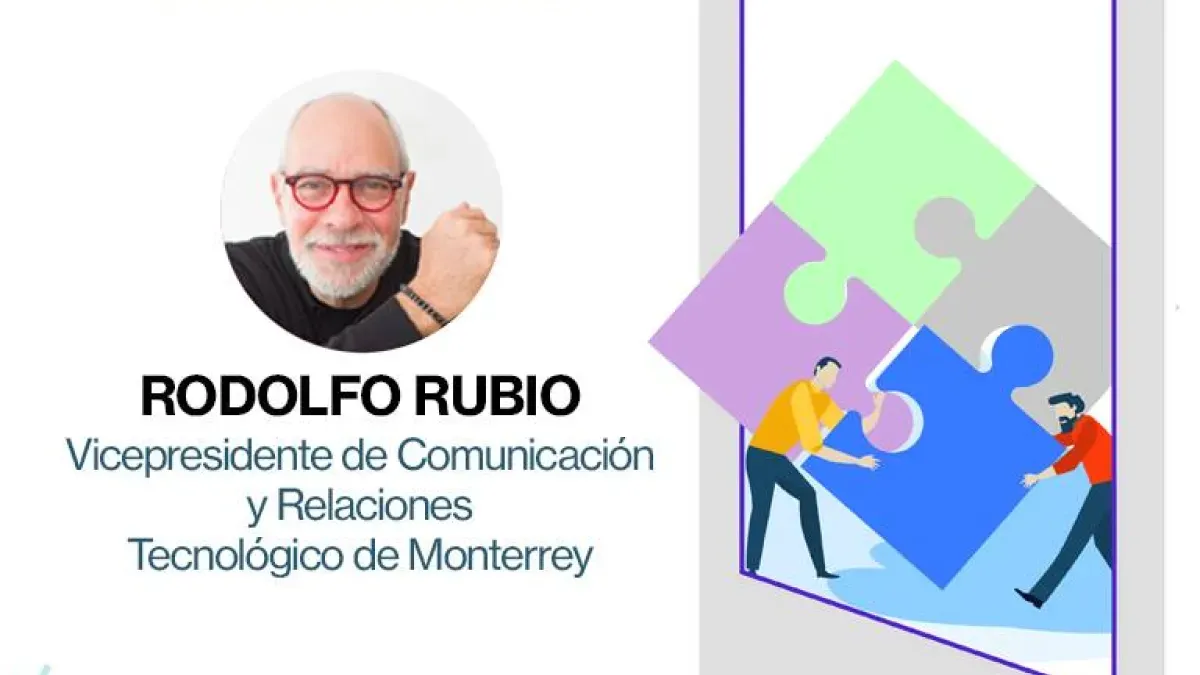
Comunicación en tiempos de COVID-19: Ejecutando con excelencia
Expositor: Rodolfo Rubio, Vicepresidente de Comunicación y Relaciones, Tecnológico de Monterrey
Rodolfo nos platicará sobre la importancia de la comunicación en tiempos de crisis e incertidumbre.
26 de Junio | 13:00 hrs
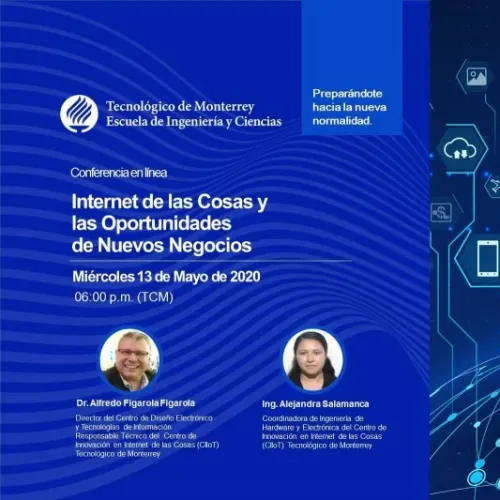
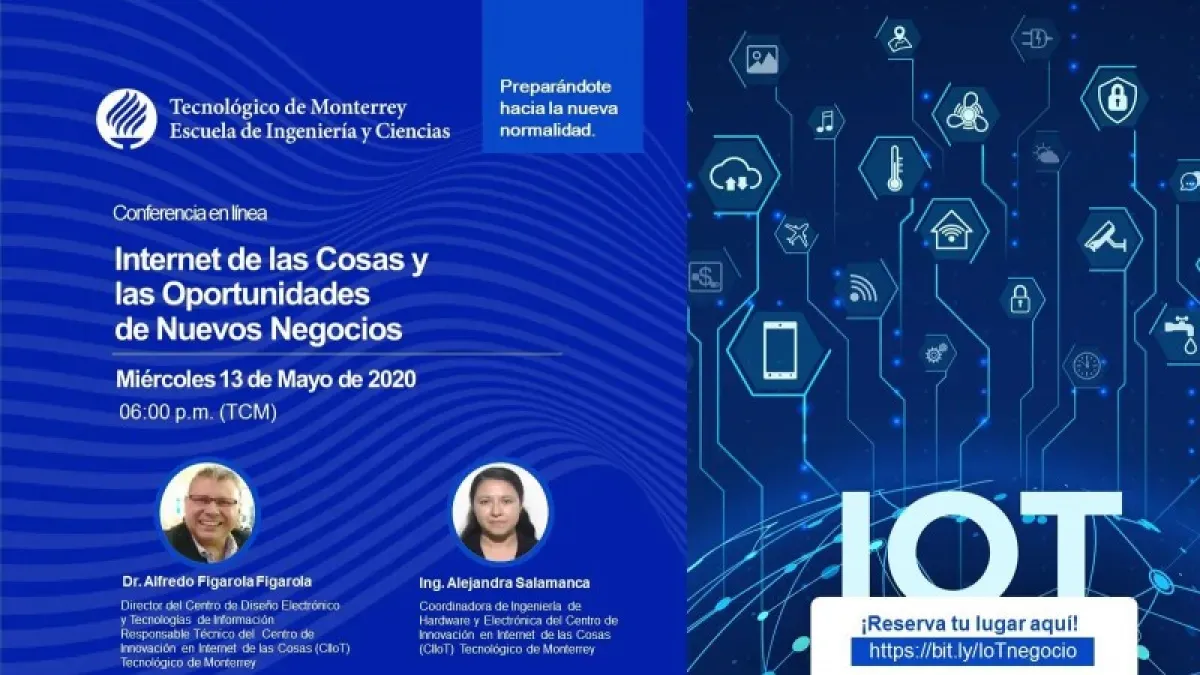
Internet de las cosas y las oportunidades de nuevos negocios
El IoT no solo es una tendencia tecnológica que aplica a diversos sectores de la economía y de la sociedad, sino que en diversos sectores tales como salud, automotriz, logística y otros, se ha convertido en un segmento de mercado por sí mismo con tasas de crecimiento anual, estimadas por las principales firmas de mercado y de TI, entre 15 a 40% para los próximos 5 años.
Ponentes: Dr. Alfredo Figarola Figarola, Director del Centro de Diseño Electrónico y TI, responsable Técnico del Centro de Innovación en IoT (CIIoT), Tecnológico de Monterrey; Ing. Janneth Alejandra Salamanca Chavarin, coordinador de ingeniería de hardware y electrónica del CIIoT.
Dirigido a: emprendedores, empresas micro, pequeñas y medianas
Impartido el 13 de Mayo
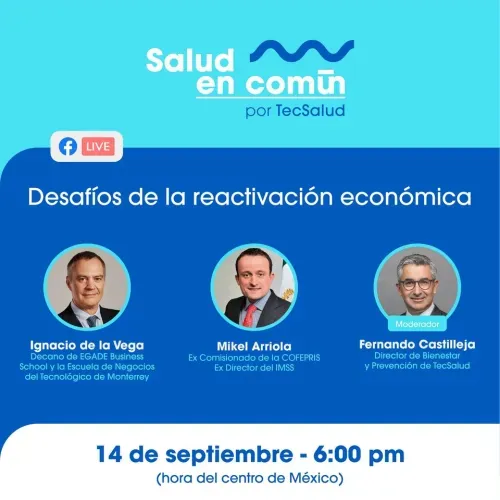
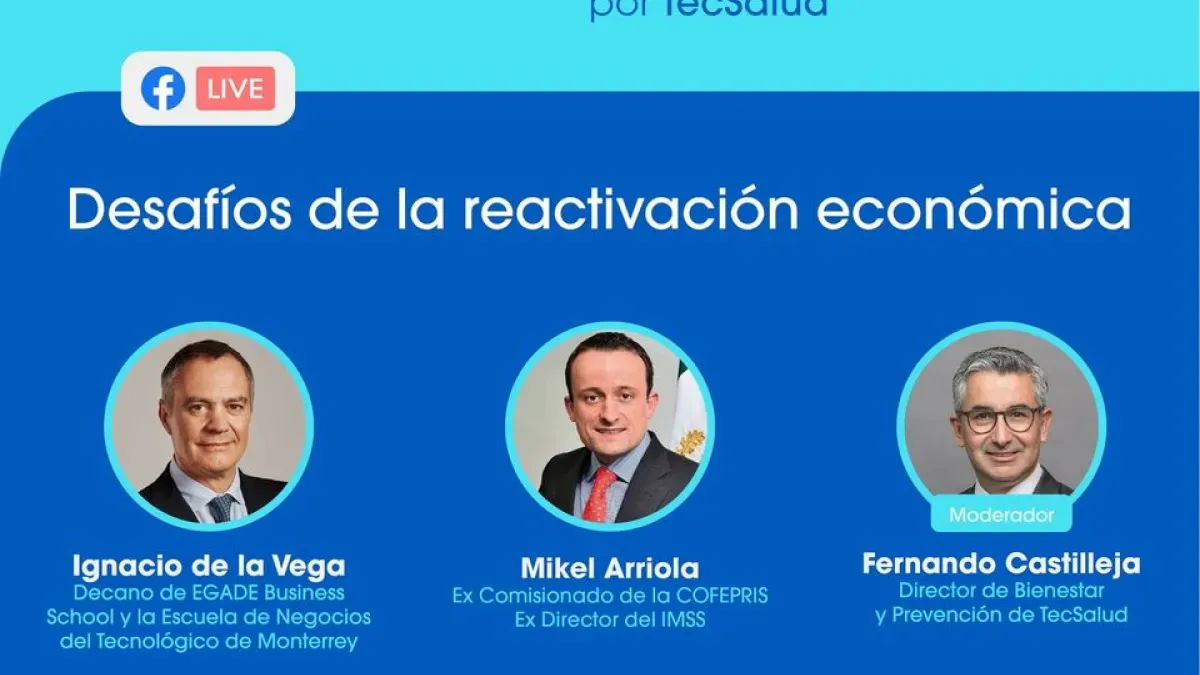
Desafíos de la reactivación económica
Expositores: Ignacio de la Vega, Decano de EGADE Business School y la Escuela de Negocios ITESM. Mikel Arriola, Ex comisionado de la COFEPRIS, Ex director del IMSS
Hoy estamos frente a la crisis más severa que hayamos padecido en un siglo y México debe enfrentar nuevos retos en los que prevalecen tres principales: salud, seguridad y económica.
Únete a esta nueva charla de la mano de Fernando Castilleja, Ignacio de la Vega y Mikel Arriola Peñalosa
Transmitida 14 de septiembre 2020




































